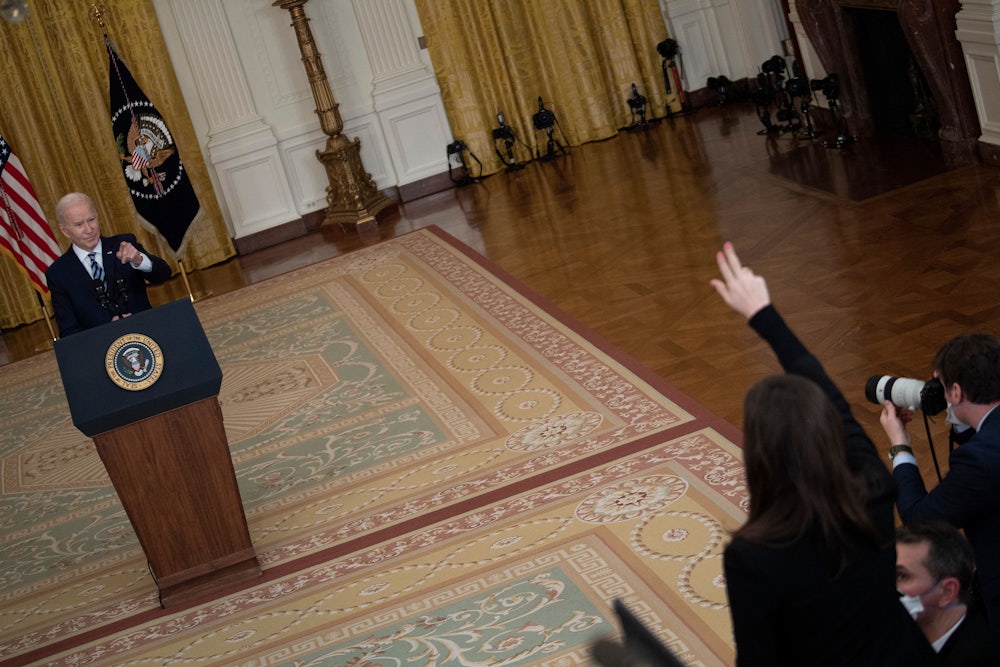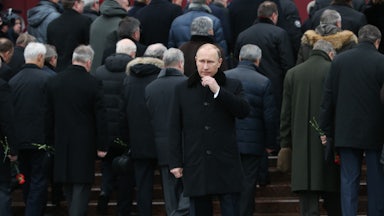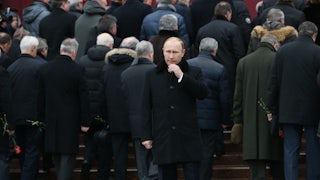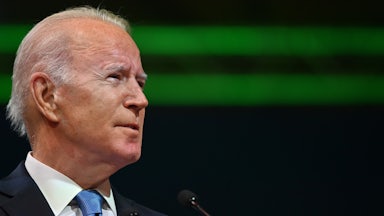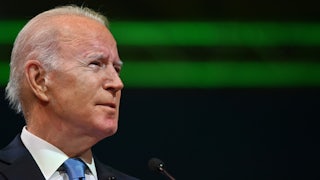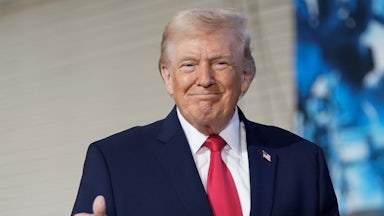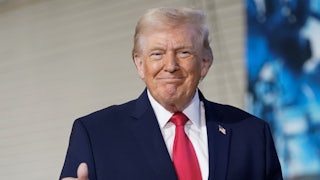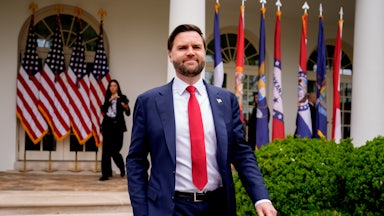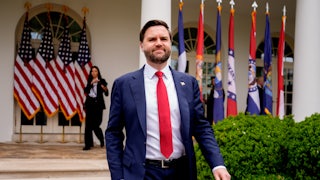From the very first days following Russia’s invasion of Ukraine, President Joe Biden has been clear that the United States would not directly intervene militarily in the war. At the same time, Biden and his administration have spoken out forcefully against Vladimir Putin’s invasion and done everything short of boots on the ground to try to support Ukraine’s position. The two most prominent elements of that effort have been continued arms and financial support for Kiev—and an unprecedented assault of economic sanctions aimed at Russia and the Kremlin.
The scale of the sanctions was immediately daunting: They would target one of the world’s 10 largest economies with the goal of increasing the cost of Russia’s war or, as Biden put it, to ensure that Putin would be “isolated from the world more than ever.” Ultimately, the goal of the sanctions regime is simple: to change the Russian president’s political calculus and spur an end to hostilities.
From a foreign policy perspective, some of this is old hat. Over the past two decades, economic sanctions have become an increasingly popular tool in America’s tool kit. Since the start of the century, the number of entities sanctioned by the Office of Foreign Assets Control has skyrocketed by more than 900 percent, from 912 in 2000 to 9,421 in 2021. As the use of sanctions has become more and more prevalent, lawmakers have become increasingly ambitious—and naïve—about what exactly they can accomplish. But eight months after Biden imposed the first tranche of painful economic sanctions on Russia, we have a fresh opportunity to evaluate their effectiveness and learn lessons that might aid in rethinking and restructuring sanctions regimes in the future.
Sanctions occupy a convenient middle ground in foreign policymaking discourse—both avoiding the high risks associated with military intervention while skirting the oft-used attack line that a failure to mete out consequences on perceived adversaries is the equivalent of appeasement. Initially viewed as a symbolic retaliatory measure when no viable military alternative was at hand, sanctions have rapidly grown into a tool of first resort in D.C.
In an age in which the American public is generally weary of directly entering armed conflicts, sanctions can be an especially convenient tool that allows decision-makers to “do something.”
Responding to pressure from activists and experts after sanctions regimes aimed at countries including Venezuela, Cuba, and Syria in recent years both failed to coerce policy changes and deepened humanitarian crises, administration officials pledged to conduct a wholesale review of sanctions policy. And although sources familiar with internal administration discussions told me that behind the scenes many officials appear conscious of and attentive to the potential shortcomings of sanctions policies, there is little tangible evidence that the Biden administration is anything but as eager as its predecessors to make economic sanctions one of the most popular tools of American statecraft. The administration has not lifted any of America’s long-lasting sanctions regimes, though Politico recently reported that the president has consistently run into roadblocks as he mulls easing certain sanctions.
The Russia sanctions, however, present an interesting case study. When the massive sanctions on Russia were announced following the invasions, even those most skeptical of economic warfare offered at least guarded support for Biden’s approach.
Privately, expectations for sanctions may have been measured. But the way in which they were sold gave many in the West a misleading sense of optimism. Though Biden said a month after the invasion that “sanctions never deter,” his secretary of state and national security adviser had previously stated that they were intended to do exactly that. As Nicholas Mulder, a professor of history at Cornell and author of the recent book The Economic Weapon: The Rise of Sanctions as a Tool of Modern War, wrote in a September essay in Foreign Affairs: “There is a notable parallel between the expectations that Russia harbored for its military invasion and what the West hoped its economic sanctions would achieve: both parties wanted to defeat their opponents with a quick, sudden strike producing immediate collapse. This obviously did not come to pass.”
The expectations that economic sanctions could deter Putin’s invasion or “bring Russia to its knees” were always a pipe dream, driven by unrealistic expectations that anyone who had paid attention to past sanctions regimes would have known were unrealistic. Sanctions can be used to send a message of disapproval or as a leverage tool to urge peace talks, but “if we look at sanctions elsewhere, they very rarely achieve these really dramatic changes,” says Erica Moret, a sanctions and humanitarian affairs expert and researcher at the Geneva Graduate Institute. “Anyone who knew how sanctions work—including those in government—would know that they are just one of many tools.”
Sanctions must have specific goals—and specific situations under which they can be lifted—in order to be effective. Bruce Jentleson, professor of public policy at Duke University and a former State Department official, told me that in early discussions he heard that the goal of the sanctions would be to “limit Russia as a long-term strategic competitor.” As Jentleson explained, “That’s OK as a secondary objective, but the primary objective and the test for the sanctions is ‘Does it help you end the war in Ukraine on favorable terms?’ Because if it doesn’t, the war could escalate.”
Measured against conditions that often evaluate the potential for success—the size of the target country, whether the country is a democracy, whether the country has alternative trading partners, and if the target government has control over media—the prospects for the package against Russia are not optimistic. “If you look down that list, Russia looks like quite a hard target to coerce through sanctions, because it’s so big and economically powerful,” says Moret. “My suspicion would be we’re probably looking at another protracted sanction regime.”
While these kinds of economic squeezes rarely work to force policy concessions, other elements of the sanctions are more promising. “The combination of [sanctions and Ukraine’s military success] has potential,” says Jentleson. “Not to get Putin to say ‘uncle’; that’s not going to happen.… But to put on enough combined pressure that could set up a serious diplomacy and negotiation to which you’d have lots of leverage.” The attempt to squeeze Putin economically likely couldn’t succeed as an isolated endeavor, Jentleson says, but these particular sanctions can be more successful because of the way in which they are directly impacting Russia’s military capabilities.
Though the eventual outcome of the sanctions effort remains to be seen, a hearing in Congress last month with two administration officials seemed to suggest that they had failed—or at least fallen short of lofty expectations. “I think that we have to have a more clear assessment in Congress and in our national psyche as to just what the impact of sanctions can do,” said Senator Mitt Romney, widely considered to be a Russia hawk, during that hearing. “The indications so far are, it wasn’t as crippling as we thought on Russia, and I wonder whether that teaches us a lesson that should be important to us as we consider the impact of sanction regimes in the future.”
Evaluations like Romney’s and others—in that Senate hearing, in the media, and elsewhere—who have questioned the effectiveness of these particular sanctions likely had unrealistic expectations for their potential, but the questions they are raising mirror many of the issues that experts have identified for decades. The administration officials most responsible for the implementation of sanctions since Biden took office clearly appreciate that sanctions are only one part of a larger policy and cannot alone compel policy concessions and that they are most valuable when imposed multilaterally. But those lessons have rarely appeared in the political mainstream.
Shortly after that Senate hearing, the House’s Tom Lantos Human Rights Congressional Commission hosted a hearing titled “Considerations on Economic Sanctions,” which focused primarily on the humanitarian impact of sanctions. In it, Representative Jim McGovern was refreshingly candid about both the shortcomings of the sanctions themselves and the ways in which they are treated in Congress.
Sometimes the uninhibited pursuit of a flawed policy approach is the most surefire way to truly unveil that policy’s shortcomings. The reflections about endless wars that sought democracy promotion and regime change in the late 1990s and early 2000s became far more pronounced when it became clear that the wars in Iraq and Afghanistan were catastrophes, even though muscular and militaristic foreign policy had been a fixation among the Beltway foreign policy set for over a decade. The revelation that the United States may not be able to economically pummel opposing countries into submission should at the very least lead to a serious discussion about what exactly economic warfare can accomplish.
Support for sanctions on Russia among policymakers is likely to remain steadfast. But interestingly, the initial defenses for those particular policies have often included acknowledgments of the shortcomings and problems with other broad-based sanctions currently in place. It usually takes a significant event such as this one to force people to question the underlying assumptions that drive policymaking.
For the moment, those asking these types of questions still constitute a minority view in Washington. (Even in the Senate hearing, Romney concluded his statement on concerns over sanctions policy by saying, “Not that we then don’t do them.… Of course we do.”) For many, it appears as if punishment is still the ultimate goal of economic warfare. I heard multiple anecdotes of administration officials citing a country’s floundering economic statistics as evidence that a particular sanction was working.
Given the ongoing brutality of Russia’s war, there is an argument to be made that the sanctions are a worthwhile enterprise simply to increase the cost of Putin’s endeavor and to continue to express disapproval. But in order to have influence over events, the sanctions will ultimately have to be used as leverage in future negotiations. Given that the appetite for diplomatic talks currently seems low—Putin has shown no indication that he is willing to stop his war, Volodymyr Zelenskiy has said that his government will not negotiate with Putin’s regime, and a recent suggestion that the U.S. should engage in diplomacy was met with harsh blowback—the sanctions will likely remain in place for the foreseeable future.
There is another appreciable wrinkle relating to the effectiveness of economic sanctions: There is some evidence that these sanctions cannot be effective right away. In the aforementioned Senate hearing, one of the witnesses, Elizabeth Rosenberg, assistant secretary for terrorist financing and financial crimes at Treasury, often reminded the Senators that the administration is viewing this sanctions package as a “long game.” This has been a key factor in some of the few sanctions projects that have been successful historically.
“If you looked at the South Africa sanctions in the early ’80s, you would have said they failed. By the late ’80s, a number of things came together, and they were clearly a factor in pushing [then-President Frederik Willem] de Klerk to negotiate with [Nelson] Mandela,” says Jentleson, who recently published the book Sanctions: What Everyone Needs to Know. But at the same time, one of the major problems with sanctions is that they are often put in place and then forgotten about; it is not uncommon for sanctions that fail to create any meaningful change to be left in place for decades.
Reflection—even honest reflection—rarely leads to immediate policy alterations in D.C. And given the lack of mechanisms in place to lift sanctions once they are implemented—and the fact that the removal of sanctions can easily be framed by their advocates as “rewards” for adversarial regimes—any hope for reform may be more likely in forthcoming sanctions regimes than for already existing ones. The two recent times that the U.S. took any steps to reverse aggressive economic policies—the Obama-era ease of the embargo on Cuba and the 2015 Iran nuclear deal—were promptly reversed by Donald Trump.
Even as the potential inability of sanctions to enforce wholesale change becomes more apparent, in some ways the sanctioning of Russia may represent a step back for those who advocate a big rethink on the matter. Some of the rhetoric over these punishments has been so dramatic, replete with suggestions that Russia could be completely isolated from the world economy or that sanctions can necessarily transform economic pain into political gain and bring about regime change.
But as Washington argues over how broad an impact sanctions may have, there is still a morning after to consider—including the lack of tools to help mitigate some of the most significant damage of massive sanctions regimes and the lack of mechanisms to ease or lift sanctions once it’s decided it’s time for them to end.
The majority of people in and around official Washington continue to support debilitating Moscow’s war effort to the greatest extent possible. Nevertheless, the massive scope and the perceived goals of this particular package may finally be leading to a much overdue reckoning about what sanctions are and what they can achieve. “Sanctions still have serious collateral impacts, which solutions like Treasury licenses do not fully address,” says Delaney Simon, an analyst with the U.S. program at the conflict resolution–focused nongovernmental organization International Crisis Group. “A rethinking of structural issues underlying sanctions programs is needed to get at the heart of the matter.”
